Aug 22, 2025 – Dharma Q&A with English Interpretation for Foreigners
Hello. Morning has dawned at Seoul Jungto Center.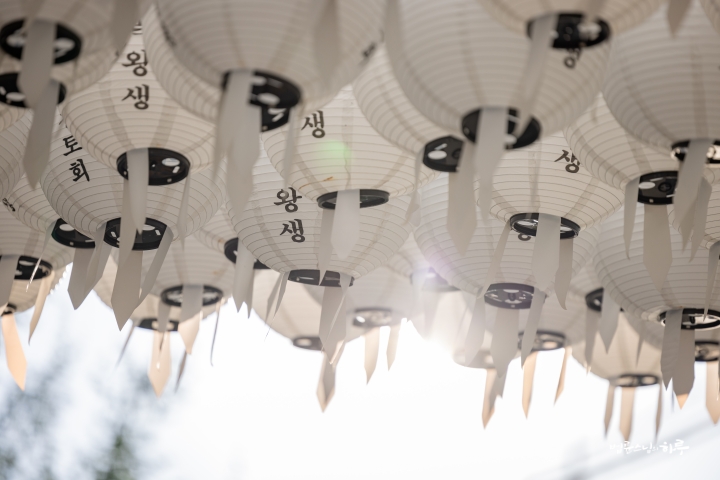
After completing his early morning practice and meditation, Sunim spent the morning packing for his overseas lecture tour departing tomorrow. After lunch, he went out for a meeting with a social figure.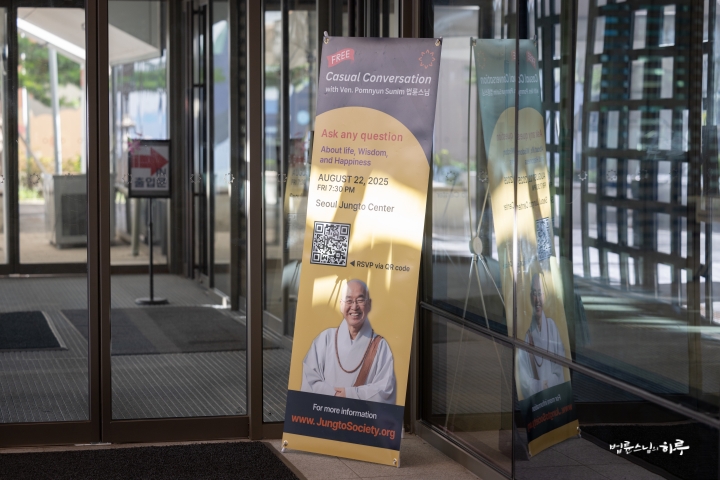
After spending two hours discussing peace on the Korean Peninsula, national unity, inter-Korean relations, Korea-US relations, Korea-Japan relations, and ways to improve North Korea-US relations, Sunim returned to Jungto Social and Cultural Center.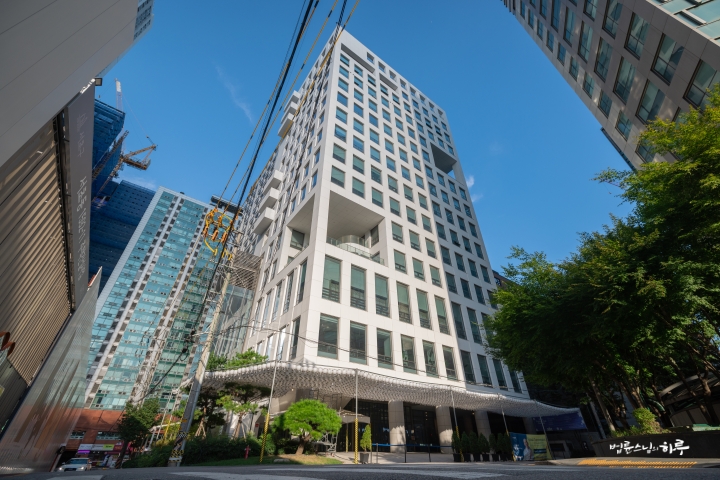
Today is the day for the Dharma Q&A with English interpretation for foreigners living in Korea. Throughout Jungto Social and Cultural Center, many volunteers from Jungto Society’s International Special Division were preparing to welcome foreign participants.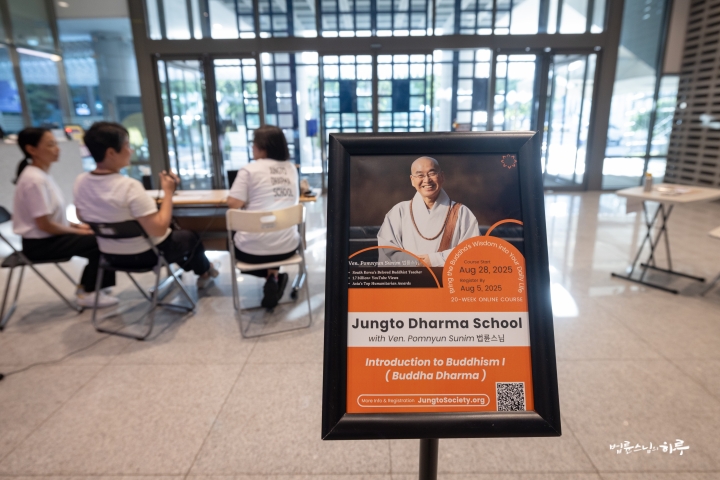
Before the lecture began, Jason, who provides English interpretation services, visited Korea and came to greet Sunim. They had dinner together in the basement dining hall and discussed President Trump’s various policies and the current atmosphere among American citizens.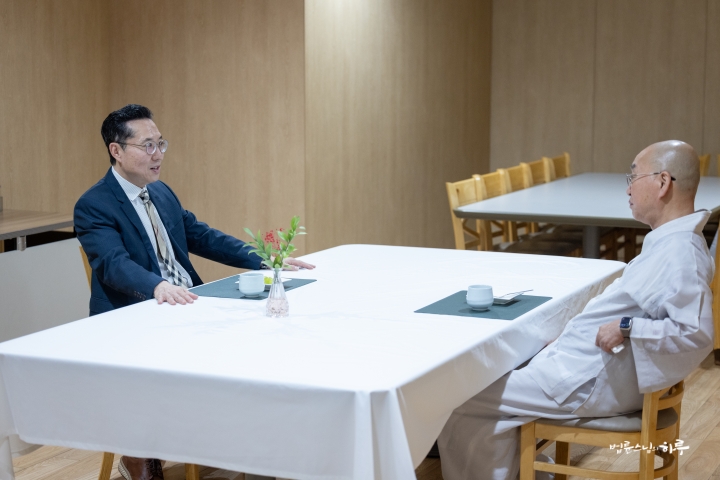
After finishing the meal, Jason’s family arrived. They had come to Korea for a family vacation and wanted to greet Sunim together. They exchanged warm greetings and caught up with each other.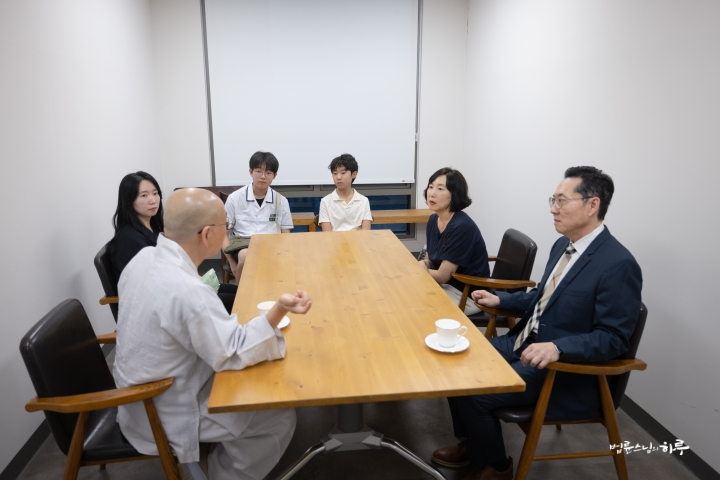
“You must be continuously busy, Sunim?”
Sunim replied with a smile.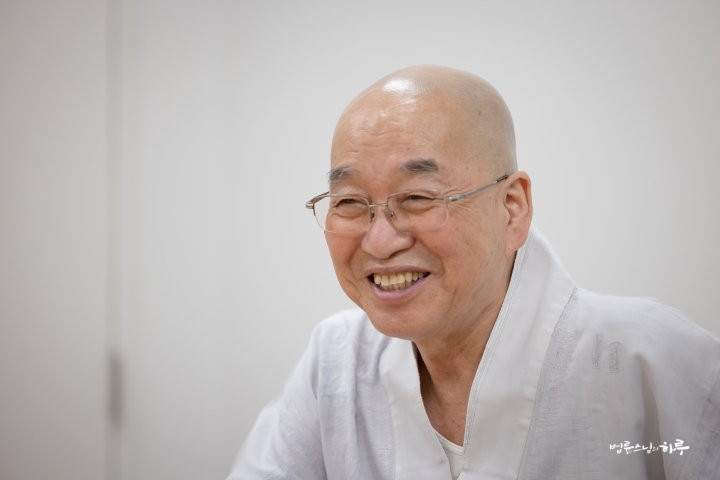
“I’m going to the United States tomorrow. I’ll enter through Seattle and give a lecture that same day, then Vancouver the next day, then San Francisco the following day. I’ll be traveling to six cities, one city per day, giving lectures. Then I’ll cross over to Australia to lecture in five cities including Sydney, go to Indonesia for a lecture in Jakarta, then head to Europe starting with London and touring major cities. After that, I’ll go to Southeast Asia for a week-long survey, then to the eastern region of North America. So my overseas schedule continues until mid-October.”
“It must be incredibly difficult with the constant time zone changes.”
“I live without jet lag. I can sleep while flying on planes. When a person is extremely busy, jet lag disappears. Even when I’m only in Korea, if something extremely urgent comes up, there are times when I work through the night without sleeping. You can think of it as similar to that.” (laughter)
“Still, it’s only possible because you’re healthy.”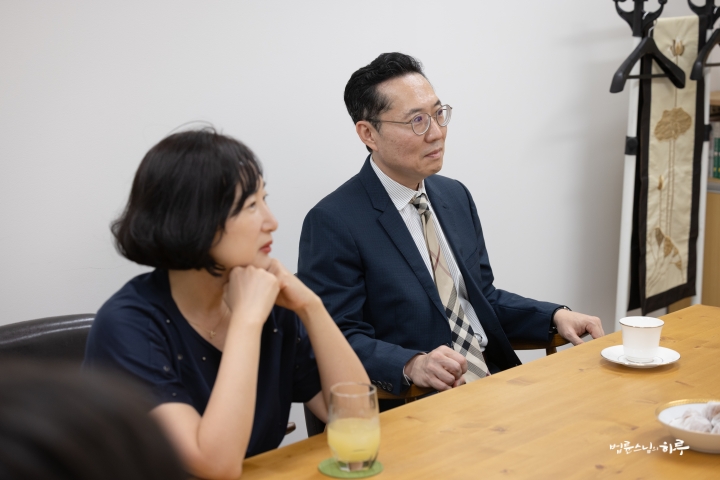
“I’m not actually healthy. I live with constant aches and pains. But if there’s a difference from other people, it’s that I live completely unaffected by whether my body hurts or not. When I’m sick, I still do what I’ve planned to do, sick or not.”
As they caught up with each other, it was time to start the lecture. They took a commemorative photo and moved together to the International Conference Hall on the 6th floor where the lecture would be held.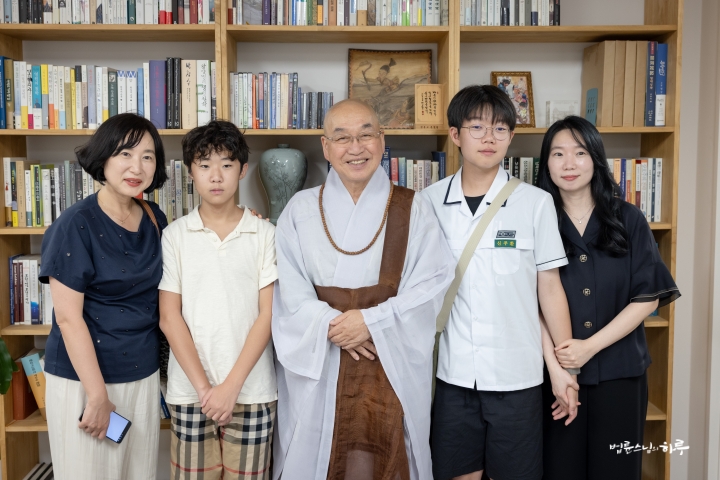
Many foreigners who had seen various promotional materials came to Jungto Social and Cultural Center to hear Sunim’s Dharma Q&A.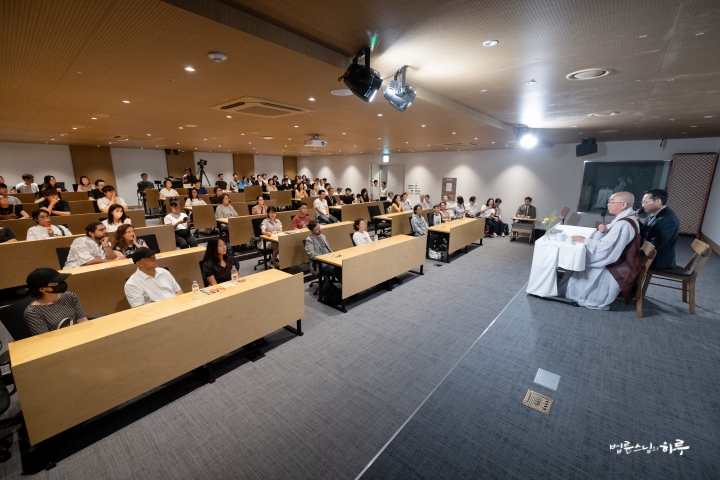
At 7:30 PM, after exchanging warm greetings, the lecture began immediately. About 50 people attended in person, and approximately 2,300 people connected via YouTube live stream.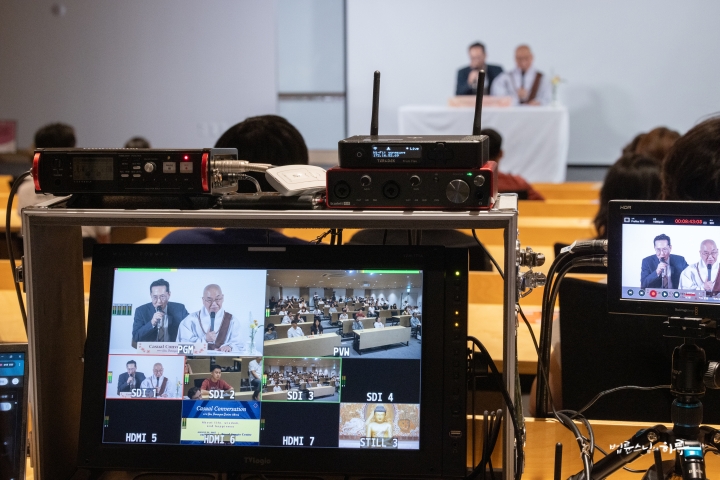
First, Sunim talked about ways to solve problems encountered while living life.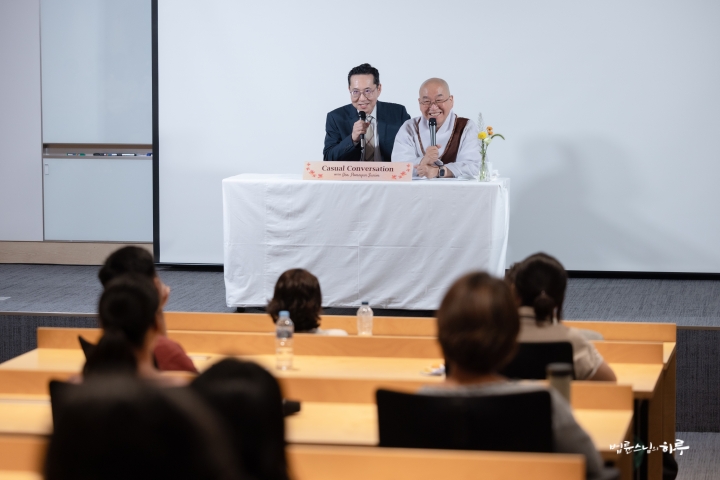
“As we go through life, we encounter various problems and must solve these various issues. However, rather than finding methods and making efforts to solve these problems, we hope they will be resolved easily on their own. This is called ‘greed.’ We should make the effort that’s required, but we try to solve problems with minimal effort, so it doesn’t work. Wanting to do something is not called greed. When a task requires 10 units of effort but we only put in 3 units of effort and hope for success, that’s what we call ‘greed.’ That’s why we’re told to let go of greed.” 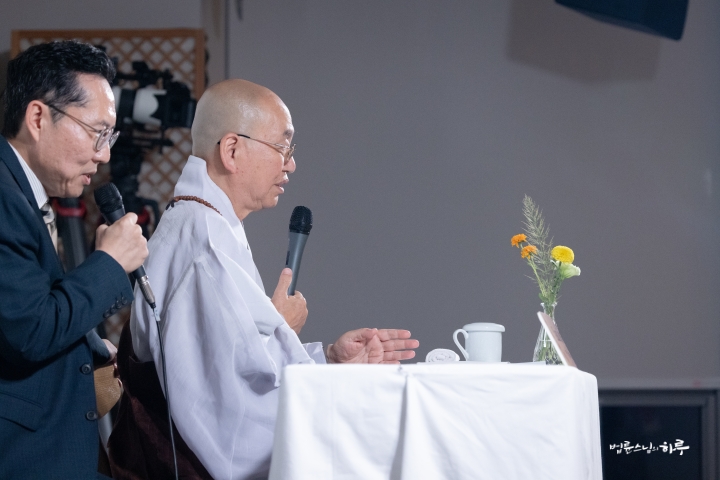
The Real Meaning of Letting Go of Greed
Letting go of greed means either abandoning the goal you’re trying to achieve with minimal effort, or putting in more effort – it’s one or the other. However, when told to let go of greed, people tend to misunderstand it as meaning ‘you shouldn’t want anything at all.’
There are two ways to solve problems. First, finding good methods to solve the problem. Second, realizing that it’s actually not a problem at all. Once you realize something isn’t a problem, there’s no need to solve it. Therefore, it’s important to clearly understand what things are actually not problems and what things need to be solved.” 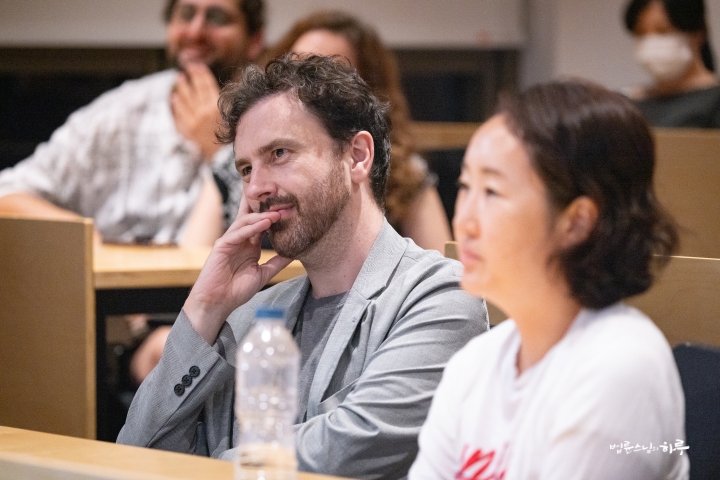
Next, Sunim took questions from the audience. Thirteen people raised their hands to ask Sunim questions. Sunim continued to give brief and light responses. One person sought Sunim’s advice, saying that the better their life goes, the more their anxiety and worry grow, making life difficult.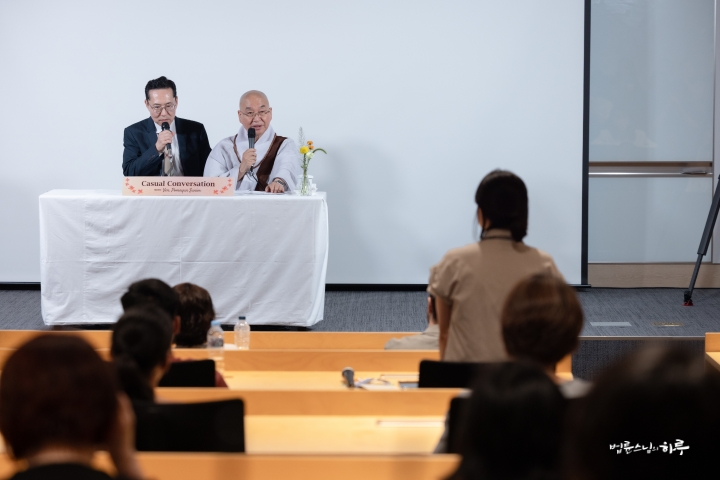
Anxiety Overwhelms Me in Moments When I Should Be Happy
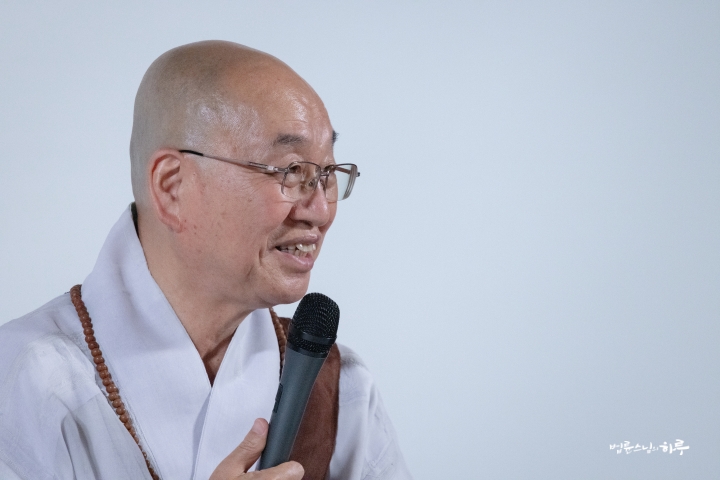
“Well, you’re a unique person. (Laughter) Would you prefer things to go well today and tomorrow? Or would you prefer things to go well today but not tomorrow? Or would you prefer things not to go well today or tomorrow?”
“I want every day to be good.”
“In life, every day cannot be good. Some days are good, and some days are bad. Some years are good, and some years are bad. If that’s the case, is it better to have a good day today and a bad day tomorrow? Or is it better to have a bad day today and a bad day tomorrow?”
“It’s better if today is good and tomorrow is bad.”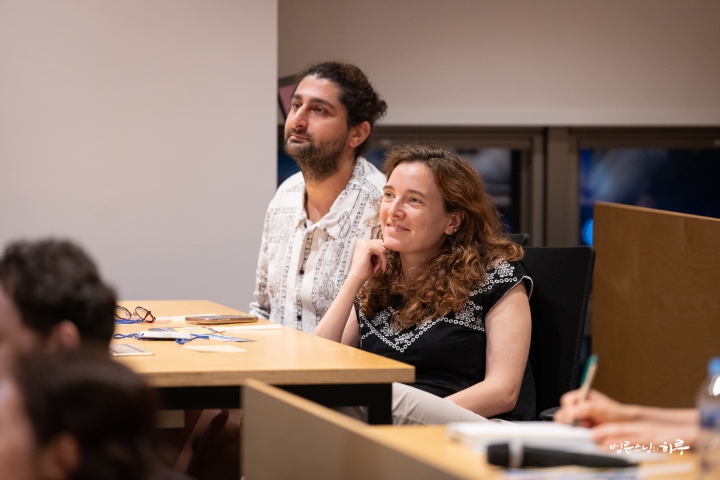
“Then you can be satisfied with today being good. However, just because today is good doesn’t mean tomorrow will be good too. Conversely, just because today is good doesn’t mean tomorrow must be bad. You’re anxious about tomorrow possibly going wrong because you hope that since today was good, tomorrow will be good too. That’s why you can’t even accept today’s goodness as goodness. Today’s goodness is today’s goodness, and if you think separately that tomorrow can be good or bad, there’s no problem.”
“You’re pursuing having a bad day today and a good day tomorrow. Or you want both today and tomorrow to be good. If we look at it mathematically, there are four possibilities: both today and tomorrow are good, today is good but tomorrow is bad, today is bad but tomorrow is good, or both today and tomorrow are bad. Among these, you only want two possibilities. You want both today and tomorrow to be good, or if not that, then today to be bad and tomorrow to be good. But life includes other possibilities too. Today could be good and tomorrow bad, or both today and tomorrow could be bad. In life, these four possibilities occur randomly. So you need to accept all possibilities. Then there’s no problem. You can accept today’s goodness as today’s and tomorrow’s events as tomorrow’s, each separately.” 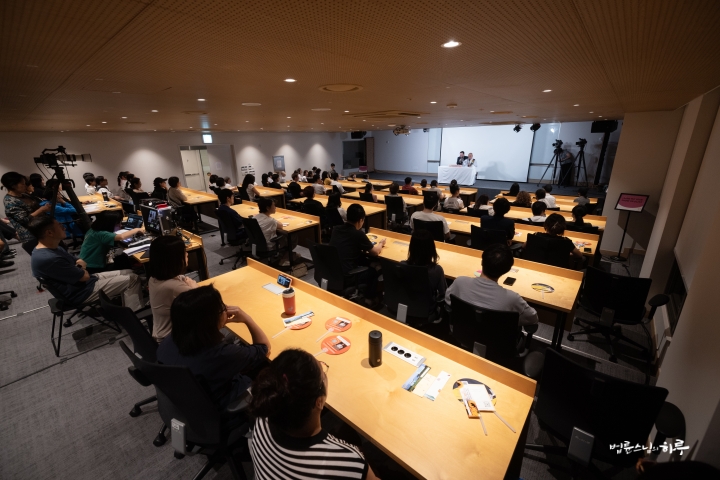
What do we mean when we say something is ‘good’ or ‘bad’? Ultimately, it’s a matter of whether things went the way I wanted them to or not. However, just because things go the way I want doesn’t guarantee they’re good. I might feel good in the moment, but that doesn’t mean the thing itself is good. If you eat a lot of delicious food today, you might feel good at that moment, but it could be bad for your health. Is this a good thing or a bad thing? Strictly speaking, there’s no such thing as good or bad. There are just days, one after another. Among them, we call it a good thing when it goes the way we want, and a bad thing when it doesn’t go the way we want.
This world moves on its own, regardless of what I want or don’t want. For example, if you’re going on a picnic tomorrow, you hope it won’t rain. If it doesn’t rain, it becomes a good day; if it rains, it becomes a bad day. But let’s say you’re planting rice tomorrow. Then if it doesn’t rain, it becomes a bad day, and if it rains, it becomes a good day. So there’s no such thing as inherently good or bad days. We just say ‘good’ or ‘bad’ depending on whether what we want happens or not. If you fall and break your arm, it’s not a bad day – it’s just a day when your arm broke. You go to the hospital and get treatment. This isn’t karma from a past life, or God’s punishment, or fate, or because you went out with your boyfriend yesterday. You just fell and broke your arm. First get treatment, then be careful to prevent it from happening again.”
“Thank you. I understand well.”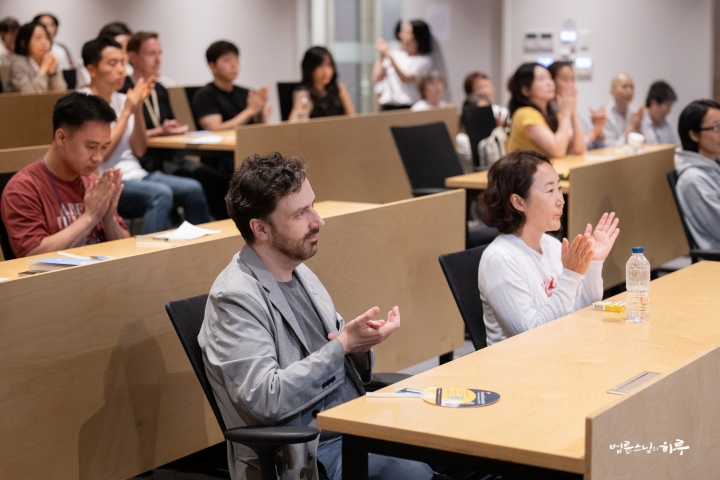
Questions continued one after another.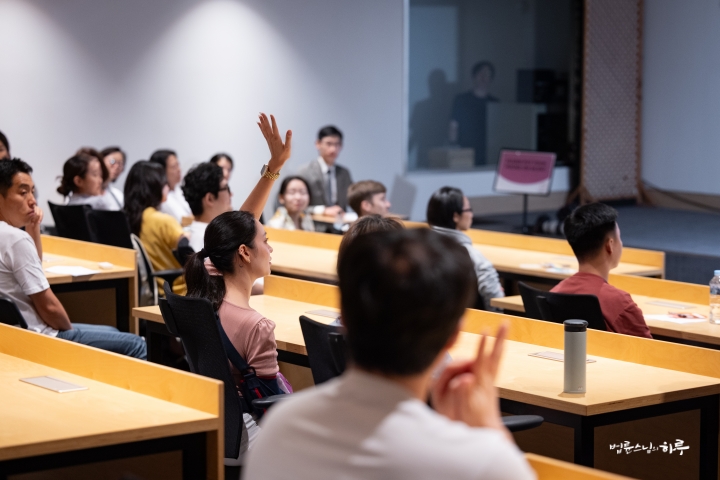
What does the Buddhist saying ‘If you meet the Buddha on the road, kill the Buddha’ mean? Why does it say to kill the Buddha?
Today’s world moves too fast. How can we slow down in daily life and discover leisure and beauty in small everyday things?
Why shouldn’t we choose suicide when life becomes difficult? Is it right for certain religions to condemn sexual orientations that are given from birth?
I’ve worked as a civil servant for 6 years and became a team leader 6 months ago. How can I balance work and people to become a good leader?
Is there a way to let go of ego and better understand other people’s perspectives? Overcoming weaknesses and accepting myself as I am seem contradictory – how can I balance them?
If I let go of all desires according to Buddha’s teachings, I feel like I’ll lose life’s driving force and become lazy. Can we achieve something while letting go of desires?
The last questioner sought Sunim’s advice on how to balance wanting to know as much information as Sunim does without being overwhelmed by too much information.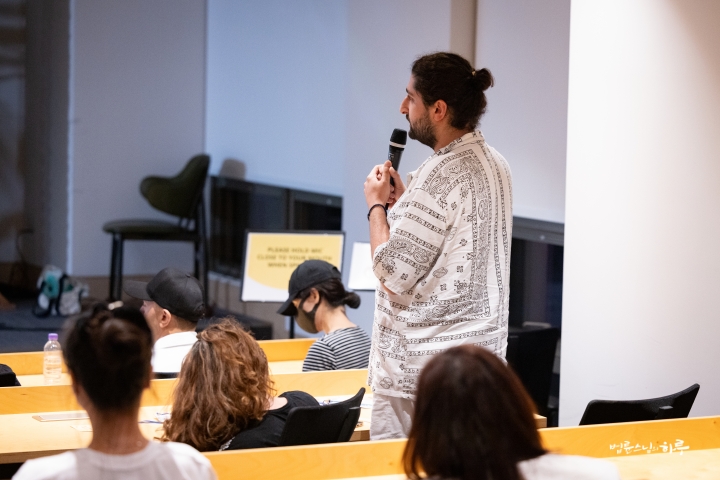
I Want to Know as Much as Sunim, but I Don’t Want to Be Overwhelmed by Information
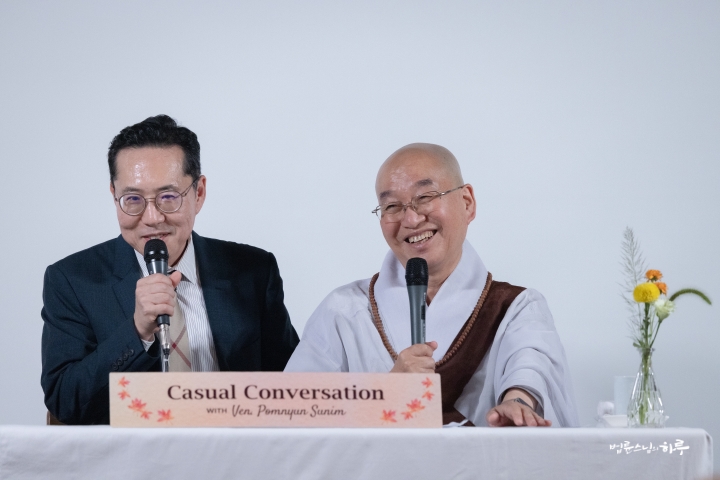
“When you reach 73 years old, you’ll know as much as I do. (Laughter) Having a lot of information requires a lot of time. Trying to gain a lot of information in a short time is greed. Also, some things cannot be achieved with just information alone. You might end up being someone who just has a lot of knowledge. You need to have insight along with acquiring information. Insight means the ability to see comprehensively. For that, you need diverse information along with diverse experiences. And among various experiences, you need to go through many hardships. Experiencing hunger for a long time, nearly dying from illness, being in danger, being imprisoned, being ostracized – when you experience such suffering, your intuition for understanding people increases. The desire to always hope for luck also disappears. That’s why monks in the old days deliberately went through many hardships. But I don’t think we need to deliberately seek hardship. However, when faced with difficulties, it’s very important to accept them thinking ‘This is a blessing for me.’ Then you won’t have fear no matter what difficulties you face.
To understand others, I must experience that suffering myself. To truly understand a hungry person, you need to fast for 50 days. When you actually experience hunger, you gain deep insight into what life is. You naturally come to understand that we shouldn’t discriminate based on religion or ideology when it comes to the problem of hunger. Also, when you experience discrimination or contempt, you realize ‘Discriminating against people is truly wrong.’ But people nowadays want to have lots of information and deep insight without wanting to go through hardships. That’s exactly what greed is. So when people ask me ‘How can I have insight?’ I answer ‘Go through some hardships.’ Then they say ‘I don’t like hardships.’ (Laughter)
What we call suffering and disasters in the world are actually great blessings from a practice perspective. Because they’re opportunities to learn with your whole body. When suffering and disasters strike, you gain many experiences in a short time. Countless thoughts flash by in a short time. It’s like having a year’s worth of thoughts in a few minutes. For example, when you’re tortured, time passes very slowly. That’s why I sometimes joke, ‘If you want to have many experiences, it’s good to be tortured.’ (Laughter) 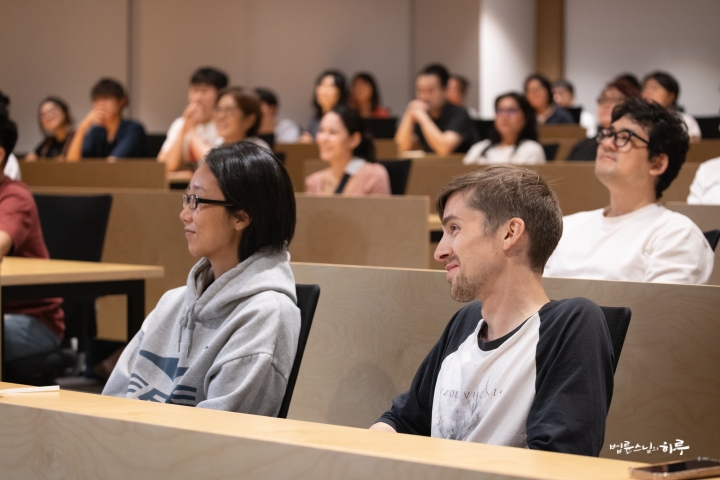
‘Disaster is a blessing,’ ‘This situation may not be entirely bad’ – if you think this way, there is nothing in the world that isn’t a blessing. That’s why I always tell young people this:
‘Don’t be afraid of anything. When you’re young, everything is just an experience. It’s not failure, it’s just experience. You don’t need to fail on purpose, but you don’t need to fear failure either.’
You are fine just as you are now. Being alive is already a great blessing. It would be nice if things got better from here, but it’s okay if they don’t. You can wear perfume or not. You can drink alcohol or not. Even if it’s the finest tobacco, it’s best not to smoke. But if you want to do it, go ahead. Not being able to do something doesn’t mean you’ve failed. Just by being alive, you have already succeeded. If you want to do more, do more. But since you’ve already succeeded, there is no failure. 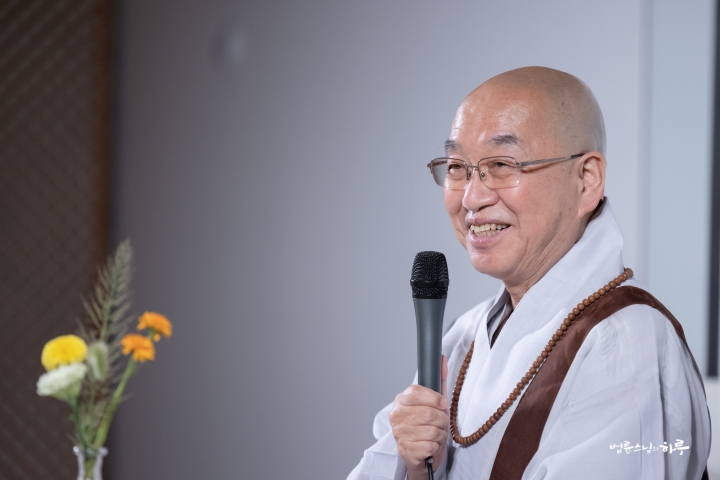
If you have this perspective, you can live with ease. Even I, Sunim, at 73 years old, live with a smile like this – why do you young people live with frowns? Being young itself is a great asset. If anyone wants to trade places with me, please come anytime. I’ll gladly switch with you.” (Laughter)
“Thank you.”
As they conversed, two hours passed quickly. The lecture concluded with thunderous applause.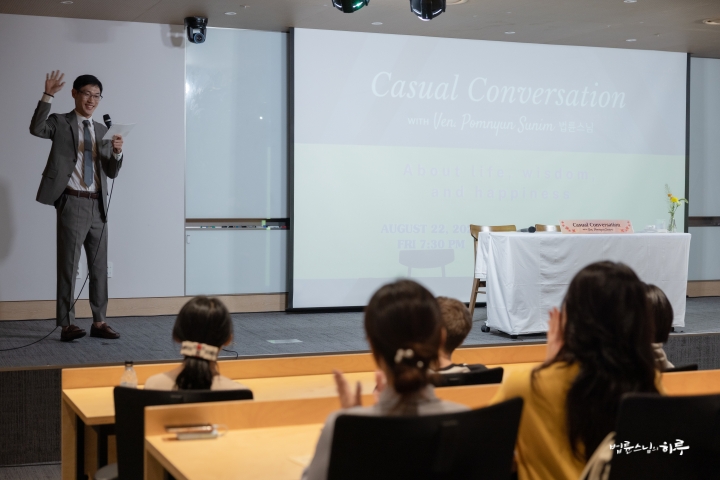

After finishing the lecture, Sunim approached the audience seats and greeted the attendees with handshakes.
“Thank you for coming.”
“Thank you.”
After taking a commemorative photo with the volunteers from the International Special Division who prepared today’s lecture, Sunim left the lecture hall after 10 PM.
“Thank you all for your hard work.”
Tomorrow morning, Sunim will pack for his overseas schedule, and in the afternoon, he will travel to Incheon Airport for his overseas lecture tour. He is scheduled to board a flight departing at 4:40 PM to Seattle, USA.





